Black coffee shops pulling in the green
By Bryan Crawford -Contributing Writer- | Last updated: May 2, 2018 - 9:50:41 AMWhat's your opinion on this article?
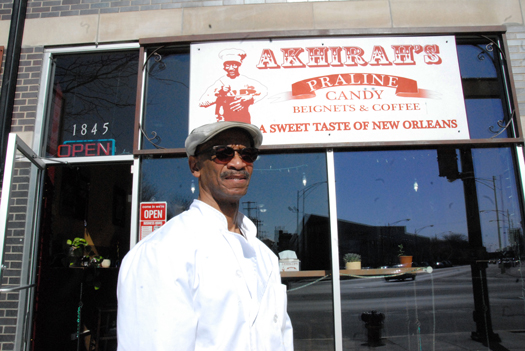
Arron Muhammad, owner of Akhirah’s Praline located in Chicago. Photo: Haroon Rajaee
|
CHICAGO—The situation involving Rashon Nelson and Donte Robinson, two Black men arrested at a Philadelphia Starbucks for behaving like any other coffee shop patron would, outraged many in the Black community already fed up with the racial bias presently faced in daily life.
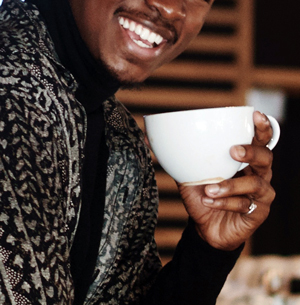
|
The question of what caused a White employee to call the police on the men who were in the establishment waiting to take a business meeting, and then detained, although not yet charged, for trespassing, has never been answered.
However, some good has come out of this situation, primarily the promotion of and continued push to support Black-owned businesses, especially coffee shops.
“In this day and age, I saw what happened as a series of teachable moments. One is, you never know who’s watching and you never know who you’re messing with,” Trez Pugh, Black entrepreneur and owner of Sip & Savor coffee shop in Chicago’s Bronzeville neighborhood, told The Final Call. “As a business owner I looked at it as an opportunity for people to see that there’s other options out there. I never want to rise off someone else’s demise—and I don’t think Starbucks is going to fall off because of this. But when that door cracked, I wanted to kick it open and let people know there’s alternatives, and good ones available. We base everything off of what I call the five Cs: Crisp, clean, classy, consistent customer service. We, as Black people, deserve the best of everything.”
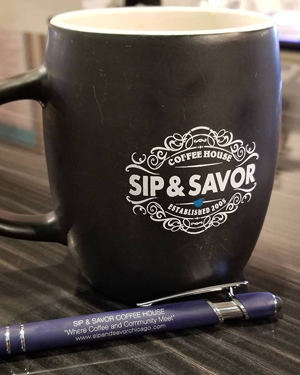
|
“I used to work at Starbucks for years, but the people who come in seem to enjoy the feel of it,” Venus, manager of Sip & Savor, told The Final Call. “They like that it’s community based. From what I’ve seen, a lot of the people who come in here know each other, and they love the ambiance, the art on the walls, and of course the fact that it’s Black-owned.”
In the aftermath of the Starbucks debacle, a national boycott began and a list of 47 Black-owned coffee shops around the country—curated by the website Shoppe Black—was created to make Black consumers aware that they have alternatives to the national chain. The list was disseminated across multiple social media platforms, and quickly spread. Some Black-owned coffee houses even noted a spike in business as a result. Kaffeine Coffee in Houston said sales increased as much as 40 percent after their business made the list. In Durham, N.C., Beyu Cafe also saw an increase in sales as a result of being named. All of this underscores that fact that Black people can and will support their own.

|
Black spending power has long been a topic that not enough Black people pay attention to or even understand.
In its report, “Black Dollars Matter: The Sales Impact of Black Consumers,” the Nielsen Company estimated that Black people in America collectively have a buying power of $1.2 trillion, despite representing just 14 percent of the American population.
What’s more interesting is that Black people dictate what non-Black people decide to spend their money on.
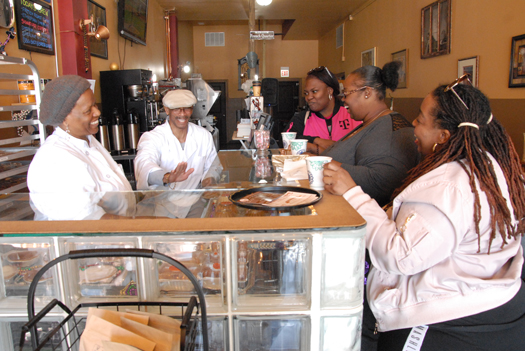
Behind the counter, Amy Muhammad and her husband Arron Muhammad share a laugh with customers at their business, Akhirah's Praline. Photo: Haroon Rajaee
|
“Our research shows that Black consumer choices have a ‘cool factor’ that has created a halo effect, influencing not just consumers of color but the mainstream as well,” Cheryl Grace, Nielsen’s senior vice president of U.S. Strategic Community Alliances and Consumer Engagement, wrote in the report. Black people are a driving force economically, and could be an even more powerful force in various other ways by deciding to continue doing business with each other and keeping Black dollars circulating within the Black community, she said.
“I push a rule I learned from a self-made Black millionaire, and it’s ‘buy from people who buy from you,’” Toure Muhammad said.
“The Most Honorable Elijah Muhammad showed us the way. If you get a bunch of us together and we start doing business with each other, we will be able to survive regardless of what’s going on around us.
And if we as Black business owners and entrepreneurs promote, push and encourage each other to share our networks with other Black business owners and entrepreneurs, then our dollars will continue to circulate. We just have to be disciplined and do it so that we can give our people an example to know that it can be done, and give them the roadmap on how to keep it going.”
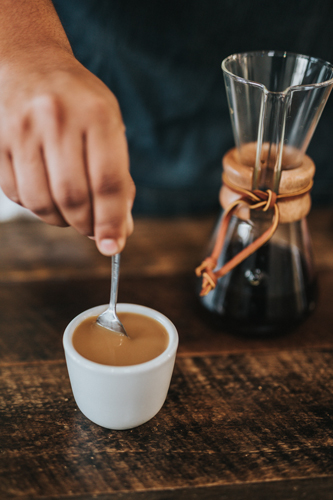
|
Starbucks recently announced that all of its U.S. locations will be closed on May 29 so that the company can conduct anti-racial bias training for all of its employees, the boycott among Black people seems to still be going strong. Black coffee shop owners across the country should continue to benefit long after the controversy has moved off the national radar.
INSIDE STORIES AND REVIEWS
-
-
About Harriett ... and the Negro Hollywood Road Show
By Rabiah Muhammad, Guest Columnist » Full Story -
Skepticism greets Jay-Z, NFL talk of inspiring change
By Bryan 18X Crawford and Richard B. Muhammad The Final Call Newspaper @TheFinalCall » Full Story -
The painful problem of Black girls and suicide
By Charlene Muhammad -National Correspondent- » Full Story -
Exploitation of Innocence - Report: Perceptions, policies hurting Black girls
By Charlene Muhammad -National Correspondent- » Full Story -
Big Ballin: Big ideas fuel a father’s Big Baller Brand and brash business sense
By Bryan Crawford -Contributing Writer- » Full Story






 Click Here Stay Connected!
Click Here Stay Connected!








